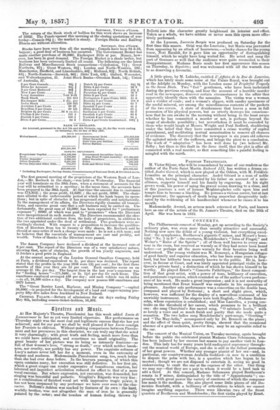CONCERTS.
The Philharmonic concert of Monday, got up according to the Society's ordinary plan, was even more than usually attractive and successful.
Nothing now save the debht of a young violinist, but everything excel,
lent: the symphonies, Beethoven's gigantic C minor, and Mozart's beautiful "No. 2 in D " ; the overtures, Mendelssohn's "isles of Fingal," and
1Veber's "Ruler of the Spirits" ; all of them well known to every ama teur in the room, but received as warmly as if they had never been heard before—or perhaps all the more warmly for their beauties being well
understood. The young violinist was M. Remenyi, a Hungarian refugee of good family and superior education, who has been some years in England, but has hitherto been scarcely known to the public. He is, however, in favour at Court, and was lately appointed principal violin in tho Queen's private band ; a distinction of which he has shown himself to be worthy. He played Ernst's "Concerto Pathetique," the finest composition of that great artist, with a power of tone, brilliancy of execution, and passionate expression, which reminded us of the author's own performance of his work. He made a great impression ; and it is not unworthy of being mentioned that Ernst himself was emphatic in his expressions of pleasure. Another solo performance was a concertino on the double bass, composed and played by Bottesini ; a short and slight piece, which, however, was sufficient for the display of a mavvellous command of his unwieldy instrument. The singers were both English,—Madame Enderssohn, whose reputation is established ; and Miss Lascelles, a young contralto on the threshold of her career, which promises to be a brilliant one : she sang Cherubini's fine sacred song, "0 salutaris hostia," with so lovely a voice and so much finish and purity that she made quite a sensation. The two ladies sang Mendelssohn's part-songs, " Greeting " and "The May-bells," accompanied only by Dr. Bennett on the piano; and the effect of these quiet, pretty things, showed that the occasional absence of a great orchestra, however fine, may be an agreeable relief to the ear.
The concert of the Musical Union, on Tuesday morning, again brought before the public the celebrated pianist Madame Clara Schumann, who has been induced by her success last season to pay another visit to London. This lady has for many years held undisputed supremacy throughout the musical world of Europe, and she is still in the fullest possession of her great powers.. Whether any younger pianist of her sex—and, in particular, our countrywoman Arabella Goddard—is now in a condition to dispute the palm with her, is a question which has begun to be mooted ; though we are not disposed to entertain it, seeing no good in endeavouring to exalt the one at the expense of the other. One thing we may say—that they are a pair to whom it would be a bard task to add a third. At this concert, Madame Schumann played Beethoven's sonata in F minor, distinguished by the title of " Appaasionata" ; expressing with great power the variety of emotions of which the composer has made it the medium. She also played some little pieces of old Domenico Scarlatti, with a brilliancy of articulation to which we cannot imagine anything superior. There were likewise two of the finest quartets of Beethoven and Mendelssohn ; the first violin played by Ernst.


























 Previous page
Previous page